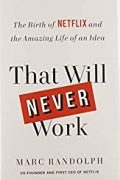
Rating: 8.3/10.
Angel: How to Invest in Technology Startups — Timeless Advice from an Angel Investor Who Turned $100,000 into $100,000,000 by Jason Calacanis
Book that’s meant to be a guide for angel investors, but is also a good reference for founders who are looking to raise funding to understand what investors are looking for. The author is a well-known angel investor who invested in several well-known companies at an early stage, including Uber and Robinhood. He presents angel investing both as a way of getting rich as well as participating in the technology of the future. Although it is risky, the odds are much more favorable than gambling in a casino with limited risk and incredible potential upside.
Founders get funded through several ways. Initially, they are self-funded with their own or their family’s money, before they go through incubators who give them around $100k. Angels invest in companies around this stage with a seed round and valuation somewhere around $4-8 million. Finally, the Series A is funded by professional venture capitalists who have a lot more money and are more selective.
Angels don’t need a lot of money to get started. When starting out, it is better to invest as a part of a syndicate, with a lead investor betting and many smaller investors putting in around $2500 each, so the total raised would be around $200-500k. Another way angels can provide value to founders is advising and introducing founders to connections in their network.
You can bet on either the founders’ ability or the market potential of their idea. When meeting with founders, it’s important to be respectful, listen to their pitch for 30 minutes then ask questions about their business model that they should be able to answer in a straightforward way, without rambling. Write notes on your decision making process and revisit them when the startups succeed or fail, so you get better at intuitively identifying which ideas are going to work for future investments.
Most of your gains will be the small percentage of investments that really take off, so the idea must have high scaling potential. At the same time, look for founders who can get things done and are willing to take risks to succeed. It’s good to have founders that are wildly optimistic about their chance of success, but bad if the founders lie to you.
After investing in a startup, ask for monthly updates so you get a chance to help them, and lack of updates usually means things aren’t going well. Failures will start to come in quickly, so your first two years will mostly be news of your portfolio companies failing, while successes take much longer to emerge.



